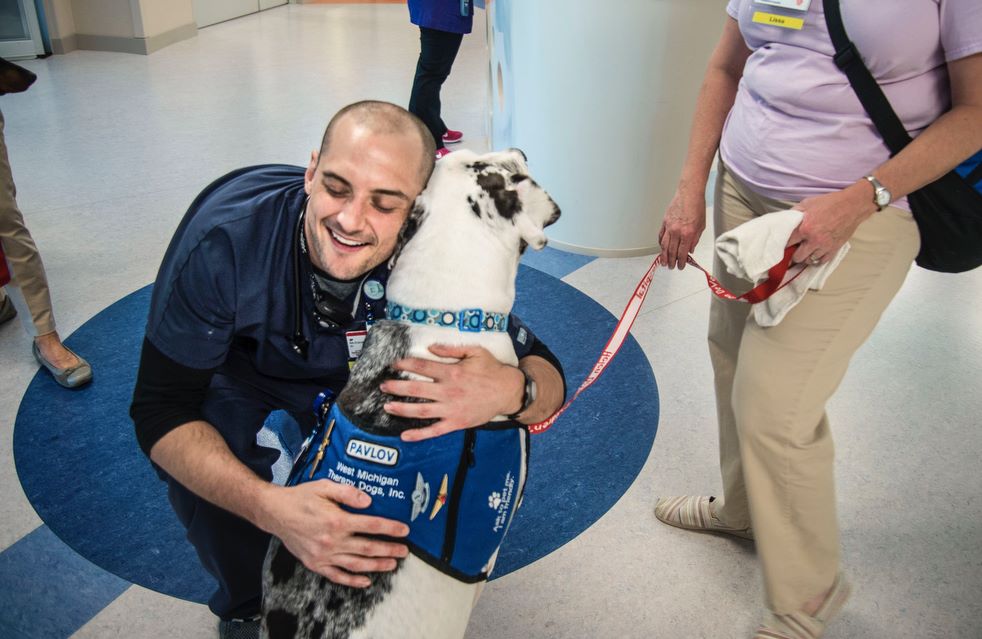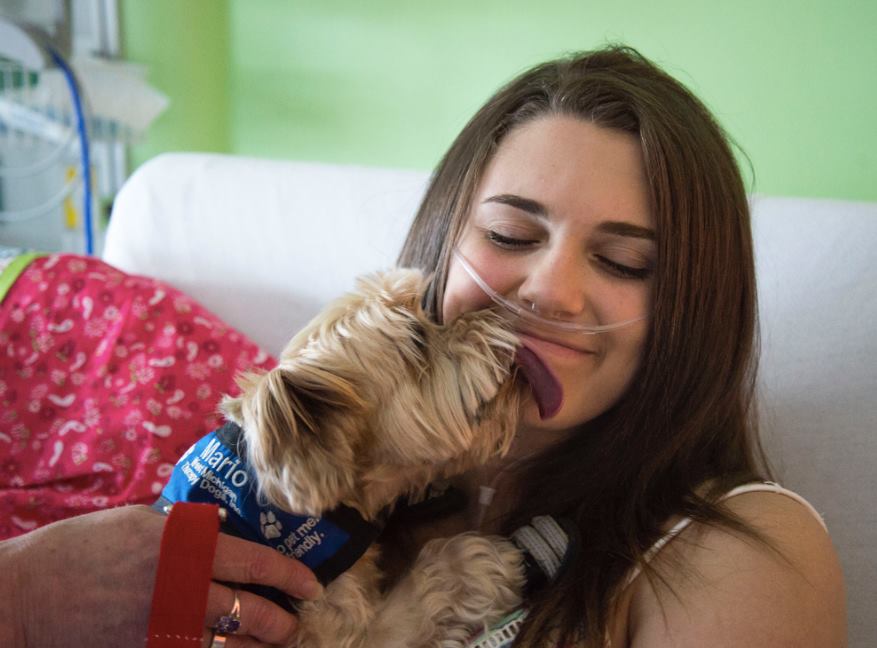What is pet therapy?
“Dogs have a way of finding people who need them, filling an emptiness we don’t even know we have.” – Thorn Jones

What is Pet Therapy?
Pet therapy is a broad term that includes animal-assisted therapy (AAT) and other animal-assisted activities (AAA). AAT involves using animals to assist individuals with health or mobility issues by participating in their therapy sessions. AAA participation is meant to provide comfort and enjoyment for all age groups.
Who can benefit from Pet Therapy?
Pet therapy can help individuals by reducing anxiety, depression, pain, and many other health problems. Others who can benefit from pet therapy include:
- People receiving cancer treatment
- People in long-term care or senior care facilities
- Seniors with dementia or brain injuries
- Veterans with post-traumatic stress disorder
- Children with autism or down syndrome
- Adults with learning disabilities
- Victims of physical or mental abuse
- And many others
Pet therapy helps the individuals the pet is visiting and the family members and staff at the facilities being visited. It can also be used in non-medical settings such as colleges, schools, and other community organizations to help those dealing with stress and anxiety.
To learn the differences between pet therapy, service animals, and emotional support animals, click here.
THERAPY DOGS VS. SERVICE DOGS & ESA’S
Learn the Important Differences
THERAPY DOGS

Therapy dogs are trained to provide social or therapeutic interaction with various populations in need of emotional, physical, or psychological support. Therapy dogs are not included under the American Disabilities Act. Petting and contact are what therapy dogs are all about.
SERVICE DOGS

Service dogs are trained to perform specific behaviors to assist an individual owner with activities of daily living. These dogs have access to public places and transportation under the American Disabilities Act. Petting service dogs are discouraged while they are assisting their owners.
EMOTIONAL SUPPORT DOGS

Emotional Support Dogs provide affection and companionship for individuals with various mental or emotional conditions. An emotional support dog is not trained to perform specific behaviors to assist with a disability. Emotional Support Dogs are not included under the American Disabilities Act.
FAQ’s
Have a Question?
Reach out!
How long are your classes?
Our classes are held on Thursday afternoons and evenings for 2 hours weekly, for a total of 8 weeks. In order to graduate, teams must attend a total of seven classes and must be present at weeks three and seven.
Can I bring my dog to work with me?
WMTD members are not allowed to use their therapy dogs while at their place of work.
What is the membership renewal process?
Our membership renewal process requires that each member be tested every 2 years with their dog, and if they pass, the team is recertified so long as membership dues are paid.
What are the costs involved in joining?
For a list of our costs for membership, please click here.
What if I go away for the winter or summer, can I still join?
If you are away for an extended period of time, we ask that you start back up slowly so that the dog can get used to working again. We ask that you visit 1 hour per month, but we ask that you average 12 hours per year if you are gone.
Is my dog too young or old to join?
The only age restriction we have is that your dog is at least 1 year old. We also ask that you live with your dog for at least 6 months before your prescreen evaluation. Our main requirements are based on the temperament of the dog, not age; we accept all breeds, mixed breeds, and rescues.
What areas do you visit? How far away do you provide therapy?
We volunteer at many different facilities within 5 counties surrounding the Greater Grand Rapids area.
How can I get your dogs to visit my facility?
If you are interested in our dogs visiting your facility, please contact our Director of Programs at WMTDPrograms@gmail.com.
What dogs can be therapy dogs?
Any breed or age dog has the potential to be a therapy dog. Your dog must know basic obedience, exhibit good manners in public, and consistently demonstrate positive interactions with other dogs and people.
What are membership requirements?
You can review a full list of our guidelines for membership here.
Where can I volunteer with my dog?
Our teams volunteer at many places such as schools, nursing homes, hospitals, libraries, and residential facilities throughout West Michigan. Requirements to participate in a therapy dog program vary from facility to facility. Some may require additional orientations, background checks, health certificates, and photo IDs for you and/or your dog. For a list of places we visit, click here.
How do I get started?
Prospective members must go through a series of screenings, training classes, testing, shadow visits, and evaluations. For more details about getting started, click here.
Is there a difference between service dogs and therapy dogs?
Therapy Dogs are trained to provide social or therapeutic interaction with various populations in need of emotional, physical, or psychological support. Service Dogs are trained to perform specific behaviors to assist an individual owner with activities of daily living. Emotional Support Dogs provide affection and companionship for individuals with various mental or emotional conditions. To learn more, click here.
Are there age requirements for the handler?
Handlers over 17 years of age may volunteer with West Michigan Therapy Dogs. Junior handlers are between the ages of 10 and 17 years of age and must be accompanied by a trained parent or trained responsible adult at all times during visits. Senior adult volunteers are also encouraged to participate.
Is there a difference between certification and registration?
Certification means that you and your dog have passed the prescreening test, gone through our training course, passed the certification test, and are eligible to volunteer as a WMTD team. Registration means that you and your dog are registered for our training classes or that you are registered to volunteer at one of our programs.
Testimonials
What our friends say about us!
WHAT IS PET THERAPY?
Pet therapy is a broad term that includes animal-assisted therapy (AAT) and other animal-assisted activities. AAT involves animals to help individuals, many with health problems, to cope or recover, whether it’s cancer, mental health issues, physical disabilities, and more. Animal-assisted activities are volunteer-based and meant to provide comfort and enjoyment to senior citizens, children, and others.
BECOME A VOLUNTEER
West Michigan Therapy Dogs, Inc. (WMTD) is a group of volunteers who provide Animal Assisted Activities to various groups in Western Michigan. Our services are free, and we do not accept monetary reimbursement for any of the services our members provide.
DONATE
We are a 501(c)(3) organization, and donations help us continue growing and reaching our goals. If you are interested in supporting our mission so we can serve more people in West Michigan, consider donating.

